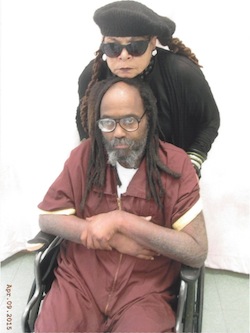

Wadiya Jamal and Mumia Abu-Jamal
Over 40 health care providers signed onto an appeal sent to Pennsylvania officials on Oct. 5, calling for a change in the state’s policy for treating political prisoner Mumia Abu-Jamal and an estimated 10,000 other prisoners suffering from untreated hepatitis C virus (HCV).
Signers include Dr. Joseph Harris, who has been monitoring Abu-Jamal’s health; Toni Arenstein, a Certified Diabetes Educator; Dr. Gabriella Beckles-Raymond, Christ College London; Caro Torrez, Emergency Room Technician and member of District 1199J, National Union of Hospital and Health Care Employees; Dr. Nancy C. Arvold, member of the Prisoner Hunger Strike Support Committee, Calif.; Psychologists for Social Responsibility; among others.
Their letter, sent to Gov. Tom Wolf, Secretary of Health Karen Murphy, Secretary of Corrections John Wetzel and Superintendent John Kerestes at SCI Mahanoy, calls for the inclusion of treatment with new, direct-acting anti-viral medications, which have a 95 percent cure rate. The PA Department of Corrections and the Department of Health claim they are currently in the process of hammering out a policy in response to legal actions taken on behalf of Abu-Jamal and other prisoners.
The Federal Bureau of Prisons adopted protocols in June mandating treatment for hepatitis C throughout the federal prison system. The American Liver Society and the BOP have both recommended immediate treatment for everyone but especially for those like Abu-Jamal who have “extra-hepatic” symptoms such as skin rash, anemia and diabetes.
After suffering for several months from extreme skin rashes and discoloration, swelling in his feet and legs, and weight loss, Abu-Jamal experienced a spike in his blood sugar levels on March 30 that resulted in emergency hospitalization for a near-diabetic coma. Later tests determined that he had been suffering from untreated hepatitis C for years.
Medical workers demand HCV treatment now
Pennsylvania currently lacks any protocol for hepatitis C treatment of prisoners and has refused requests from Abu-Jamal and other prisoners for the newer anti-viral medications on the grounds that they would cost too much or that the prisoners’ symptoms are not severe enough to warrant treatment. While proper treatment for HCV is expensive, it would prove less costly over time than, if left untreated, ministering piecemeal to related illnesses.
If left untreated, hepatitis C in state prisons eventually affects the broader population outside of prison. A 1997 study estimated that 29 to 43 percent of all people infected with HCV pass through a correctional facility. Called a “silent epidemic,” hepatitis C has a disproportionate impact on impoverished communities and people of color.
Medical workers, including first responders — emergency medical technicians and emergency room doctors and nurses — are also heavily at risk. Not surprisingly, a number of the people signing this appeal are public health care providers or members of unions representing public health care workers.
Dr. Joseph Harris, a HIV/HEP C specialist, stated, “It is not rocket science to understand that Pennsylvania prisons represent a very important place for treatment of these diseases to start as part of public health policy.”
High drug prices are not a legitimate excuse to deny treatment. Retired Philadelphia psychiatrist Berta Joubert-Ceci said, “Pharmaceutical companies claim they have intellectual property rights to new medicines and can charge whatever they want to cover the costs and make a profit. However, health care is a human right that should take precedence over intellectual property rights when it’s a life-or-death issue.”
Dr. Suzanne Ross, a clinical psychologist and longtime Abu-Jamal supporter, called the denial of medicines and proper medical treatment to prisoners “inhumane.” Ross noted, “It is an illegal imposition of punishment, humiliation and torture of prisoners. For Abu-Jamal and other prisoners infected with hepatitis C, it is a death penalty by medical neglect.”
All quotes come from the Oct. 5 press release issued by the International Concerned Family and Friends of Mumia Abu-Jamal and the International Action Center.
May 19, 2025, will mark the 135th birthday of the great Vietnamese leader Ho Chi…
Philadelphia Honoring the 11 people murdered by the state when they dropped a bomb on…
The centennial of the birth of Malcolm X, also known as El-Hajj Malik El-Shabazz, is…
On May 11, which was Mother’s Day this year in the U.S. and several other…
Philadelphia On Mother’s Day 2025, May 11, Families for Ceasefire Philly and over 20 local…
North Philly Peace Park gathering After a federal court hearing on an anti-immigration bill early…